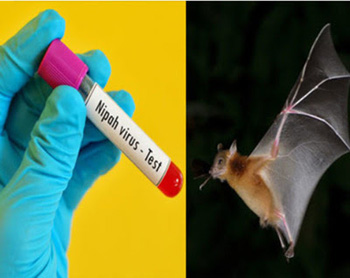Nipah scare, don’t trust local brews: Experts
Nipah scare, don’t trust local brews: Experts
Mangalore Today News Network
Mangaluru, May 25, 2018: Some of the ‘home remedies’ against the Nipah virus (NiV) doing the rounds on social media are like : Boil six leaves of night-blooming jasmine(parijatha) in 200ml of water and prepare a 100ml kashaya. Add black pepper powder and three drops of lime juice. Consume the mixture thrice or four times a day; consume honey with onion extract regularly.
 While researchers are yet to find a cure for the deadly virus, messages on the ‘power of Indian herbs’ has caught the attention of social media users, especially WhatsApp.
While researchers are yet to find a cure for the deadly virus, messages on the ‘power of Indian herbs’ has caught the attention of social media users, especially WhatsApp.
“These home remedies should be condemned outright,” said Dr Srinivas Kakkilaya, a consultant physician. “Nipah is a serious infection involving the brain and it causes encephalitis. Such patients need immediate hospitalisation and intensive care. Most patients require artificial ventilation until the virus subsides.
Kakkilaya claimed only one antiviral drug has proven effective so far. According to newspaper reports, the Kerala government has procured 2,000 such tablets and has ordered for another 8,000 tablets.
Mangalore based, Dr Edmond Fernandes, CEO, CHD Group, also rubbished the home remedies. “Let alone any home remedy, there is no treatment for NiV,” he said. He urged the public not to believe such messages and refrain from circulating them.
“The messages circulating on social media and also the promotion of alternative forms of medicine to cure NiV must be ignored,” Dr. Fernandes said. “Any development of illness during such times is best attended to by the medical community only.”
Ayurvedic doctors, too, said there is no treatment as yet for NiV. “Any medicine has to satisfy certain criteria to be released in the market. There is no treatment for NiV in Ayurveda as yet,” Dr Gautham Alva of Alva’s Ayur Care said.
The first known case of Nipah transmission to human was reported in the late 1990s. So far, around 600 such cases have been reported across the world. The previous two outbreaks reported in the country – Siliguri in 2001 and Nadia in 2007 – saw a fatality rate of 68% and 100% respectively. The average mortality rate in these 600-odd cases is between 50% and 70%.
- Case Against BJP Leader CT Ravi Over Social Media Post: Karnataka Poll Body
- Lok Sabha polls-24: 63% voter turnout recorded in phase 2
- LS elections 2024: Left rattled by allegations of CPI(M) veteran’s plans to join BJP
- Tejasvi Surya booked for ’seeking votes in the name of religion’ on polling day
- ‘He will shed tears’: Rahul Gandhi’s sharp attack on PM Narendra Modi
- Lok Sabha elections: 4 men collapse and die amid Phase 2 voting in Kerala
- BJP becomes first Indian party to cross Rs 100 crore ad spend on Google
- 78 year old woman, on oxygen support, casts vote in Bengaluru
- Long queues outside Bengaluru hotel for free Benne Dosa, Ghee Laddu on polling day, Watch
- What happens if NOTA gets maximum votes? Supreme Court notice to poll body
- BJP candidate K Sudhakar booked for ’Bribery’ in Karnataka, Rs 4.8 Cr cash seized
- 2 Terrorists dead, 2 army personnel injured as gunbattle resumes in J&K’s Baramulla
- Belthangady: Banjarumale records 100% voter turnout in Lok Sabha polls
- Dakshina Kannada, Udupi sees voter turnout of nearly 72%
- Mangaluru International Airport initiates work on precision approach lighting system
- Sandalwood star Rakshit Shetty casts his vote in Udupi, Watch
- Brisk polling across Dakshina Kannada constituency
- Ashta Mutt pontiffs cast vote in Udupi
- Udupi: Candidates Jayaprakash Hegde, Kota Srinivas Poojary exercise franchise
- Vittal: EVM technical glitch delays voting at Karopady booth
- Orange alert: Karnataka State Disaster Management cell gives animated advisory
- Lok Sabha elections 2024: Voting underway in 14 constituencies in Karnataka
- Mangaluru: Activists clash with media, police at Capitanio
- Karnataka Lok Sabha election: Voting timings, Key candidates and phase 2 polling constituencies
- Sullia: Rider dies in bike-jeep collision
- New residential complex for the judges inaugurated in Mangaluru
- Absconding accused nabbed after 8 years
- Truck with cylinders turns turtle in Beltangady
- Bhoota Kola artist dies of cardiac arrest
- Development of the country should be our goal: Ganesh Karnik
- Container truck gets stuck under Modankap railway bridge
- Truck crushes bike’s pillion rider near BC Road
- Head constable dies of heart attack
- Udupi: PDO dismissed over financial irregularities
- CREDAI to resume Skill Development Program for Construction Workers in Mangaluru
- John B Monteiro elected president of Rachana Catholic Chamber of Commerce & Industry
- Sudhanshu Rai elected district president of All College Student Association
- Chief Minister to visit Mangaluru, Udupi on August 1
- Nitte University awards PhD degree to Tina Sheetal D’Souza
- Sachitha Nandagopal honoured by CMTAI for Community Service
- CITY INFORMATION
- TRAVEL
- TOURIST INFORMATION
- HEALTH CARE
- MISCELLANEOUS




 Write Comment
Write Comment E-Mail
E-Mail Facebook
Facebook Twitter
Twitter  Print
Print 

